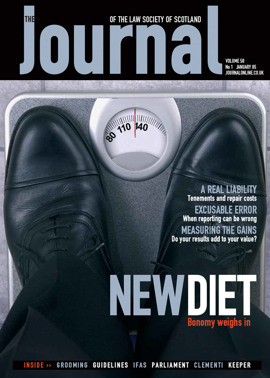Round the houses
The Holyrood programme
The Executive’s legislative programme for 2004-05 will see 12 bills introduced during the new session, with five bills previously introduced being finalised during 2005. First Minister Jack McConnell announced the programme in the first debate in the Scottish Parliament’s permanent new home at Holyrood.
Still to be introduced during the next year are: the Budget Bill; the Environmental Assessment Bill; the Family Law Bill; the Health Service (Miscellaneous Provisions) Bill; the Housing Bill; the Licensing Bill; and the Further and Higher Education Bill.
Bills now in progress include: the Charities and Trustee Investment (Scotland) Bill; the Protection of Children and Prevention of Sexual Offences Bill; the Fire (Scotland) Bill; the Water Services (Scotland) Bill; the Emergency Workers (Scotland) Bill; the Gaelic Language Bill; the Transport Bill; and the Prevention of Female Genital Mutilation Bill.
The Society has particular interest in the Charities and Trustee Investment Bill, for which it has long argued. This will put on a statutory footing the Office of the Scottish Charities Regulator (OSCR) and extend the powers of trustees to make investments. The Society is also interested in the Family Law Bill, which proceeds upon the Executive’s consultation Family Matters: Improving Family Law in Scotland. It is expected that this will bring forward changes to the Divorce (Scotland) Act in respect of the periods for separation with and without consent on which the irretrievable breakdown of a marriage can be established.
The Society has also made comments on the Prevention of Female Genital Mutilation Bill and will be contributing to the debate on the Protection of Children and Prevention of Sexual Offences Bill.
Another measure of substantial interest to the Society and its membership is the Licensing (Scotland) Bill, which brings forward changes to the Licensing (Scotland) Act 1976 in the light of the report by Sheriff Principal Nicholson.
Westminster measures
In the Queen’s Speech, terrorism, organised crime and drugs were central to the Government’s priorities. Bills announced included: the Serious Organised Crime and Police Bill; the Anti-Social Behaviour Bill; a bill to deal with harassment from animal rights extremists; the Identity Cards Bill; a bill to establish a new Commission for equality and human rights; the Disability Discrimination Bill; and an English Charities Bill.
A number of bills introduced in session 2003-04 were carried over to 2004-05. These include the Constitutional Reform Bill, which creates a Supreme Court for the United Kingdom in place of the Appellate Committee of the House of Lords and the Judicial Committee of the Privy Council; and a Gambling Bill which contains many provisions extending to Scotland.
The Society has particular interest in the Serious Organised Crime and Police Bill and has made representations in advance of the second reading. This bill follows the Home Office white paper One Step Ahead: A 21st Century Strategy to defeat Organised Criminals. It creates the Serious and Organised Crime Agency, which brings together the responsibilities of the National Criminal Intelligence Service, the National Crime Squad and sections of HM Customs & Excise responsible for organised drug and people smuggling. It creates new powers to collect evidence and compulsorily question potential witnesses, including advisers, and creates a new offence of belonging to an organised crime group. The Proceeds of Crime Act 2002 is also amended. One controversial point which applies in England and Wales, is the creation of a religious hate crime provision which is already causing substantial debate in Parliament.
The Identity Cards Bill was based on the Home Office consultation paper on the Introduction of Entitlement Cards. These were intended to reduce identity theft and fraud. A draft bill was published on 26 April 2004. Consultation was completed on 20 July and followed by pre-legislative scrutiny by the Home Affairs Select Committee. The bill sets out a framework for identity cards and establishes a national identity register. This is a database of information for all UK residents issued with a card and data sharing powers to conduct background checks on applicants. It is envisaged that there will be a new executive agency which will take over the work of the UK Passport Service and work in conjunction with the Home Office Immigration and Nationality Directorate. The universal identity card will be issued along with passports and cost around £87. This measure is likely to be of substantial controversy when it is debated, particularly regarding the powers of the Government to gather, record, retain and disseminate personal data.
In the Scottish Parliament, some of these measures will be debated in the context of Sewel motions including the Animal Welfare Bill, the Constitutional Reform Bill, the Disability Discrimination Bill, the European Union Bill, the Gambling Bill, the Inquiries Bill, the International Organisations (Amenities and Privileges) Bill, the National Lottery Bill, the Railways Bill and the Serious Organised Crime and Police Bill.
Michael Clancy, Director of Parliamentary Liaison, Law Society of Scotland
In this issue
- Riding the wave of change
- Last stand for the defence
- Losing the wait
- What right to be wrong?
- Prevention as the cure
- No room for half measures
- Poles apart
- Get IT right
- The value proposition
- A time for resolution
- When it falls, it falls
- Round the houses
- Private bills and public interest
- Charging Peter to pay Paul
- Fair pay for liquidators
- Website reviews
- Book reviews
- Fair notice?
- The new title conditions






